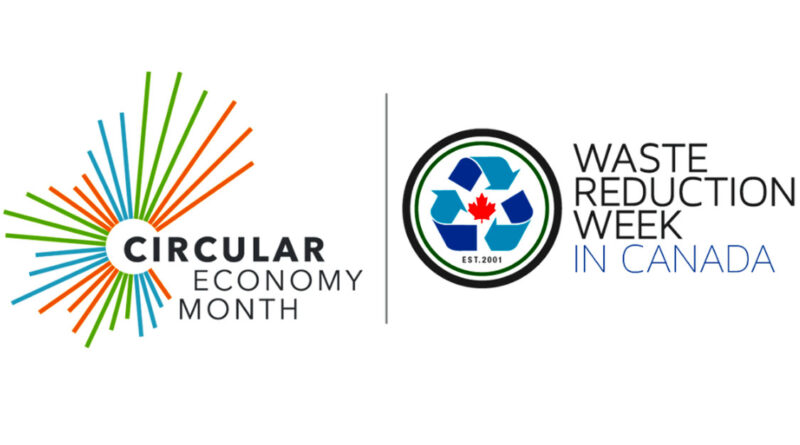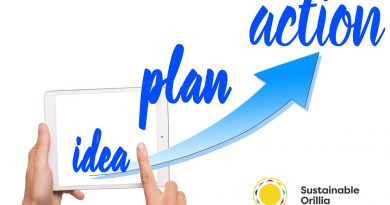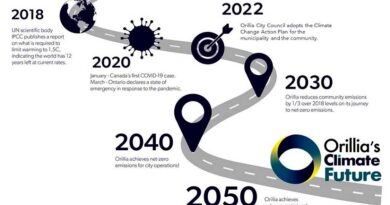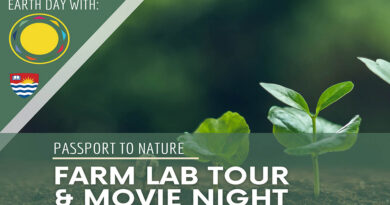Full Circle
By Fred Larsen – Special to SUNonline/Orillia
Are you familiar with the Circular Economy?
Did you know that you are already an active contributor to the circular economy?
It’s news for many of us, so please read on to learn what it means and how the circular economy relates to our day-to-day lives, present and future.
One of Canada’s leading environmental, non-profit organizations, the Circular Innovation Council (CIC) is promoting Circular Economy Month throughout October, which makes this a good time to explore the subject. Their goal is to build public awareness of what is meant by a circular economy and to reinforce how we can all do our bit to reduce waste while preserving our quality of life.
The health of our economy plays a vital role in our quality of life. Good jobs, the cost of living, consumer confidence, and growth are all drivers in building a robust economy. Those same elements are critical underpinnings in a circular economy as well – with one significant difference; in a circular economy, decisions are taken with environmental consequences in mind.
In the Circular Economy, businesses, organizations and individuals prioritize our planet’s finite resources and emphasize durability and waste reduction in their designs, manufacturing processes, and purchases. They integrate many of the Rs – like re-imagining, rejuvenating, rebuilding, reusing, repairing, repurposing, redesigning and so on, into their product’s life span. More simply, in a circular economy, things are designed, made and used in sustainable ways that last, and they can be repurposed, shared or, at a minimum, recycled at the end of their original use.
The circular economy concept emerged in the 70s and has been gaining momentum among economists, governments and corporate social responsibility advocates ever since. Because it’s an economic theory, there has been, understandably, much analysis and interpretation (economists are, after all, famous for framing their opinions as on one hand, and on the other hand). However, the concept is complex only in its implementation, not in its structure, and that’s where we find ourselves today.
When you read those R words, no doubt you are doing many of them; most of us have already one foot in the circle. Now we just need to build on our circularity and encourage others to do likewise. We can do this through purchasing decisions, how we maintain, share and repurpose goods, and of course, how we advocate and vote.
Designing out waste and pollution is one of the Circular Economy’s guiding principles, as is keeping products and materials in use long-term and promoting the regeneration of natural systems, such as composting. What does that mean for us in our everyday lives? Here’s some simple examples to get us thinking about the things we can do that are indeed part of the circular economy.
| Limit waste & the use of natural resources | Make the most of what we have | Give back to our planet |
| Buy well-made and package-free products Buy less Share – rides, bikes, tools, gardens, etc. | Repair something that breaks Donate to second-hand stores Try to wear your clothes, two times before washing | Put food scraps into the green bin Use non-toxic cleaning supplies Plan your meals and reduce food waste. |
Sustainable Orillia will be teaming up with weRcircular, a not-for-profit organization dedicated to building awareness and commitment to the principles of a circular economy across communities – the business community, in particular. The founder of weRcircular, Audrey Bayens, is well-known among Orillians for her ongoing volunteer work, including her leadership as co-chair of Sustainable Orillia’s Goods & Services Sector Team.
It’s in this capacity Audrey, along with her co-chair, Jacobi Clarke, will be launching a comprehensive recognition program for Orillia and regional businesses who are practising green and circular economic practices. The Sustainable Orillia Business Challenge Awards program will be launched early in 2023. Detailed information on how to participate and why businesses, small and large, will benefit will be available soon, so stay tuned. It’s going to be exciting!
Over the next few months, Sustainable Orillia will be featuring articles and events associated with the Circular Economy, starting with an invitation to explore some of the CIC’s resources as part of this month’s program. Visit the CIC website and get more information on their programs—or follow us, Sustainable Orillia, on Facebook and Instagram.
We are looking forward to sharing more in the months ahead. Meanwhile, if you are interested (and we hope you are) here’s another link which will take you to a more comprehensive introduction to the Circular Economy.
(Image Supplied)




